|
|
|
Sort Order |
|
|
|
Items / Page
|
|
|
|
|
|
|
| Srl | Item |
| 1 |
ID:
156949
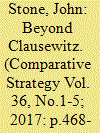

|
|
|
|
|
| Summary/Abstract |
Clausewitz has much to tell us about strategy. However, his most fundamental and enduring insights are obscured by his problematic theorizing about war in general. Essentially the same insights have been more clearly and economically articulated in the fields of political philosophy and game theory. As such, these literatures provide a more accessible introduction to the basics of strategy. The real value of Clausewitz resides in his profound understanding of how basic strategic dynamics play out in the specific context of war.
|
|
|
|
|
|
|
|
|
|
|
|
|
|
|
|
| 2 |
ID:
163046


|
|
|
|
|
| Summary/Abstract |
Over the past 25 years, the UK’s part-time military force has gone through five major revisions – not just changes in size and structure, but significant re-orientations of strategic purpose. Jeremy Mooney and John Crackett revisit the fundamental transformations that it has undergone since the closing years of the Cold War and look at the factors that have reshaped it.
|
|
|
|
|
|
|
|
|
|
|
|
|
|
|
|
| 3 |
ID:
142635
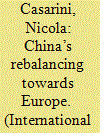

|
|
|
|
|
| Summary/Abstract |
Chinese leaders tend to think strategically about Europe. By following the process of European integration closely in the last decades, they have succeeded in identifying at different historical junctures those European integration initiatives that would serve China’s national security and foreign policy objectives. EU policymakers, instead, appear unable to think strategically about China as EU member states tend to focus on bilateral relations with Beijing, thus undermining Brussels’ capacity to fashion a clear and coherent China policy. There is thus a glaring disparity between Beijing and Brussels when it comes to strategic thinking. With China’s economic and political rebalancing towards Europe underway, there has never been more need for an adequate response from the Union.
|
|
|
|
|
|
|
|
|
|
|
|
|
|
|
|
| 4 |
ID:
187314
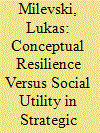

|
|
|
|
|
| Summary/Abstract |
The West produces a lot of strategic thinking, most of it ad hoc responses to present stimuli not only rarely analytically or strategically useful but often damaging existing and useful strategic theory as a consequence. Lukas Milevski applies resilience to strategic theory and contrasts it with its opposite, social utility. Resilience is explained and applied to the particulars of strategic thought. The social utility of ad hoc theory is recognised, notably in attracting attention, which even militaries need to do. The tension between conceptual resilience and social utility should be reflected in strategic education so that the advantages of both are maintained.
|
|
|
|
|
|
|
|
|
|
|
|
|
|
|
|
| 5 |
ID:
174867
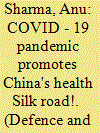

|
|
|
| 6 |
ID:
100982
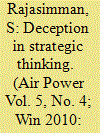

|
|
|
| 7 |
ID:
138588
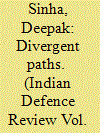

|
|
|
| 8 |
ID:
101254


|
|
|
| 9 |
ID:
174702
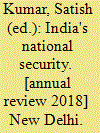

|
|
|
|
|
| Publication |
New Delhi, Pentagon Press, 2018.
|
| Description |
xxii, 416p.: maphbk
|
| Standard Number |
9789386618412
|
|
|
|
|
|
|
|
|
|
|
|
Copies: C:1/I:0,R:0,Q:0
Circulation
| Accession# | Call# | Current Location | Status | Policy | Location |
| 059910 | 355.033054/KUM 059910 | Main | On Shelf | General | |
|
|
|
|
| 10 |
ID:
142462


|
|
|
| 11 |
ID:
139498
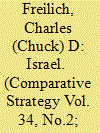

|
|
|
|
|
| Summary/Abstract |
The article is a first attempt to systematically assess the impact of leaks on Israeli decision-making. Five major cases were studied on three levels: whether leaks affected the process, policies adopted, and outcomes. Leaks had a strong impact in two cases, but not on the policies adopted, or outcomes, in any of the cases analyzed. As a tentative conclusion, most leaks are about Israel's broad strategic thinking and the politics thereof, rather than hard information. The primary impact is on process, important in itself, not substance.
|
|
|
|
|
|
|
|
|
|
|
|
|
|
|
|
| 12 |
ID:
104457
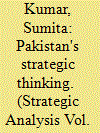

|
|
|
|
|
| Publication |
2011.
|
| Summary/Abstract |
The strategic outlook of the political, bureaucratic and military elites in Pakistan was shaped by historical exigencies, geopolitical location, Pakistan's self-perception, and its Islamic credentials. Pakistan's military-dominated leadership formulated strategies towards regional and extra-regional powers based on its threat perceptions. The strategies adopted have not necessarily resulted in fully achieving the objectives for which they were formulated.
|
|
|
|
|
|
|
|
|
|
|
|
|
|
|
|
| 13 |
ID:
125363
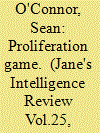

|
|
|
|
|
| Publication |
2013.
|
| Summary/Abstract |
The increased proliferation of cruise and air defence missile systems is providing smaller states with advanced military capabilities Sean O'Connor outlines the key proliferators and the impact this trade is having on strategic thinking.
|
|
|
|
|
|
|
|
|
|
|
|
|
|
|
|
| 14 |
ID:
132587
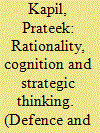

|
|
|
|
|
| Publication |
2014.
|
| Summary/Abstract |
A fundamental debate in international relations pertains to the application of rationality and context to different situations. Rationality is a hugely debated concept in philosophy. Across disciplines, the conceptualization of rational thought and practice provides various puzzles and problems. Yet, it is the most in?uential concept in modern day parlance and forms the foundations of approaching any problem. To be rational, according to Plato, is to let reason govern all intrinsic human thinking. He says reason is the supreme quality of human beings which gives them their unique character. The internal re?ective process of a human being is what gives him/ her an evolutionary advantage. Knowledge, according to rationality, is
innate and achieved through continuous reflection and processing. One's surroundings, undoubtedly, constrain or enable reason but the latter is the final instrument through which human beings have the ability to shape the environment to their advantage. Aristotle considered reason analogous to a charioteer who steers the seemingly irrational aspects of human thinking i.e. spirit and appetite. Further, there are myriad debates within the concept of rationality itself.
|
|
|
|
|
|
|
|
|
|
|
|
|
|
|
|
| 15 |
ID:
161907
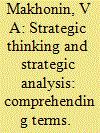

|
|
|
|
|
| Summary/Abstract |
This paper looks at two concepts fairly popular in military political analysis, to wit: strategic thinking and strategic analysis, from the viewpoint of logic. When exploring strategic thinking, attention is focused not only on the interpretation of the notions thinking and strategy, but also on the content of thinking, which is to follow the rules of logic. Strategic analysis is examined strictly as a method.
|
|
|
|
|
|
|
|
|
|
|
|
|
|
|
|
| 16 |
ID:
052774


|
|
|
|
|
| Publication |
Hampshire, Palgrave Macmillan, 2004.
|
| Description |
xviii, 157p.Hbk
|
| Series |
Corporations in the Global Economy
|
| Standard Number |
1403934061
|
|
|
|
|
|
|
|
|
|
|
|
Copies: C:1/I:0,R:0,Q:0
Circulation
| Accession# | Call# | Current Location | Status | Policy | Location |
| 048376 | 658.4012/DIV 048376 | Main | On Shelf | General | |
|
|
|
|
| 17 |
ID:
123981


|
|
|
|
|
| Publication |
2013.
|
| Summary/Abstract |
The United States intervention in Afghanistan since 2001 has brought progress in some areas, but the conflict has expanded, the Taliban remains powerful, and misgovernance and predation are widespread. Afghan national security forces - the linchpin of the coalition's exit strategy - offer no guarantee of future stability.
Many accounts describe the mistakes that led to this predicament. This article attempts to explain why these mistakes were made by examining their underlying or structural causes. Based on 51 interviews with officials and experts, it identifies major US policy-making errors with respect to state-building, military activities and diplomacy. It argues that there are four principal underlying causes of such errors, relating to organizations, leadership and strategic thinking, psychology, and domestic politics.
It finds that there were severe shortcomings in the acquisition and processing of information and a lack of institutional self-evaluation; civilian and military leaders made major strategic misjudgements in mistaking the strategy for the goal, overestimating the efficacy of military force or resources, and drawing false lessons from history or analogous cases such as Iraq; leaders were predisposed to overconfidence and oversimplification; and, at the highest level, policies were distorted by domestic politics.
The article contends that the cumulative impact of these shortcomings was sufficient to seriously disrupt the functioning of the foreign policy-making system. It argues that action is required to improve US information gathering and assessment, systematize institutional self-evaluation, build regional expertise, establish mechanisms to understand the motivations and perceptions of other actors, and increase awareness of decision-makers' cognitive flaws and biases.
|
|
|
|
|
|
|
|
|
|
|
|
|
|
|
|
| 18 |
ID:
181999
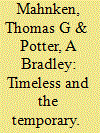

|
|
|
|
|
| Summary/Abstract |
A central challenge of the military profession revolves around how best to understand future wars and the strategies needed to fight them. Colin S. Gray grappled with this matter throughout his long and productive career. His work offers antidotes to strategic faddism and technology fetishization that often characterize discussions of war and peace. Although Gray is no longer with us, his takes on the future of war and strategy are worth revisiting now more than ever. A world increasingly defined by U.S.-China competition, a meddlesome Russia, belligerent regional powers like North Korea, and the growth and spread of new ways of war demands careful thinking about the future of armed conflict. His work can help guide scholars and practitioners through the fog of such contested peace.
|
|
|
|
|
|
|
|
|
|
|
|
|
|
|
|
|
|
|
|
|